
5 minute read
Effectiveness of Remote Didactic Learning for Oral and Maxillofacial Surgery Residents
Joshua D. Segal, D.D.S., M.D.; Monika Patel, D.D.S.
ABSTRACT
The novel coronavirus (SARS-CoV-2) pandemic has had a profound effect upon the clinical and didactic learning of oral and maxillofacial surgery residents. Restrictions on the assembly of residents for teaching sessions significantly limited the residents’ exposure to interactive didactic material. The Division of Oral and Maxillofacial Surgery at Northwell Health/Long Island Jewish Medical Center responded to this educational deficit by establishing a grassroots cooperative lecture series among over 20 oral and maxillofacial residency programs. Following the lecture series, in order to evaluate the effectiveness of this strategy, an electronic survey was sent to participants. Questions focused on the subjective assessment of learning outcomes, comparing online lectures to those in a traditional setting. The report presented here summarizes the overall responses (19.3%) received from participants.
The novel coronavirus (SARS-CoV-2) pandemic has dramatically changed the way in which many facets of healthcare institutions function. It has necessitated a paradigm shift in the way we interact, and many specialties have transitioned to telehealth models to accommodate “social distancing” guidelines put in place by the World Health Organization and the United States Centers for Disease Control and Prevention.[1,2]This has inevitably affected our ability to gather as residents for didactic lectures and discussions, and a transition has taken place to a virtual learning model.
Within our oral and maxillofacial surgery community, academic programs and associations have been taking the initiative to develop educational content for trainees and practitioners. The Division of Oral and Maxillofacial Surgery at Northwell Health/ Long Island Jewish Medical Center established a lecture series with almost 400 participants. A survey was subsequently distributed to assess the effectiveness of this learning environment. Previous research has suggested that e-learning can have a positive effect on knowledge acquisition across a wide range of learners related to health professions,[3] and the evaluation of the effectiveness of virtual learning is important for learners and educators alike.
Methods
An electronic survey, approved by the Institutional Review Board of Northwell Health, was launched between June 2020 and July 2020 among oral and maxillofacial surgery residents and attendings who were present at a weekly virtual lecture series organized by the Northwell Health/Long Island Jewish Medical Center residency program. The survey was performed using the Survey Monkey online platform. A link to the anonymous survey, along with a general introduction and consent, was sent by email to 399 participants on June 30, 2020. All attendees of the virtual lecture series who provided e-mail addresses were included in the email.
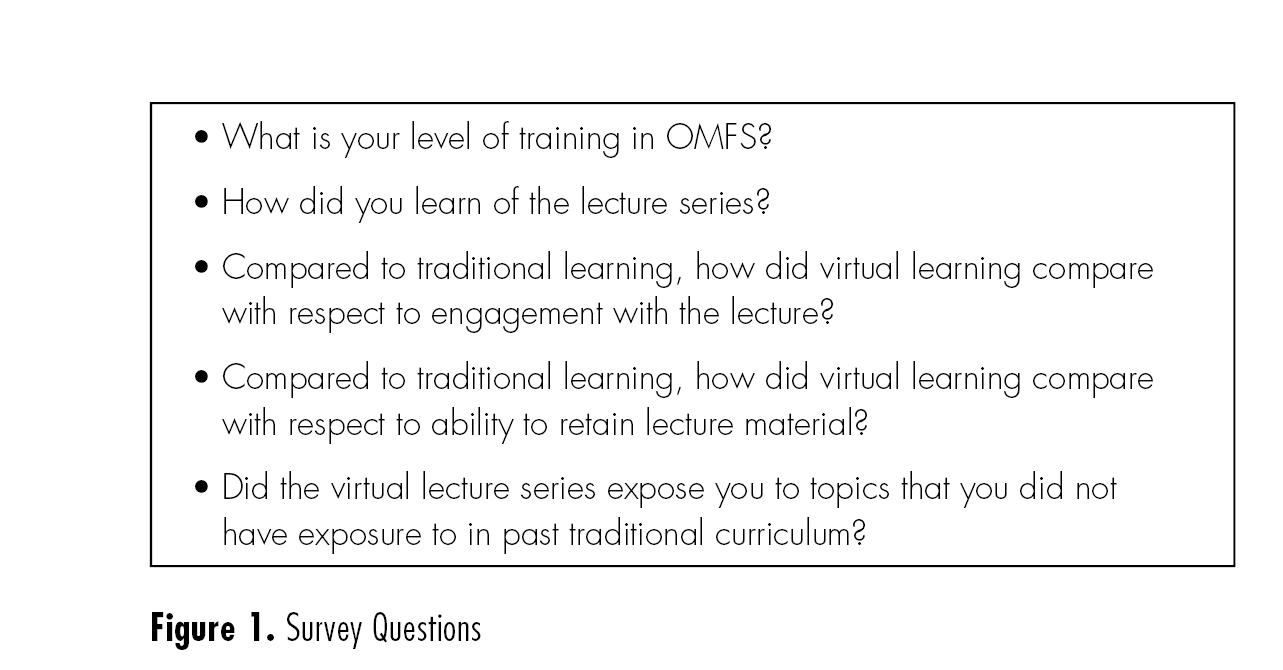
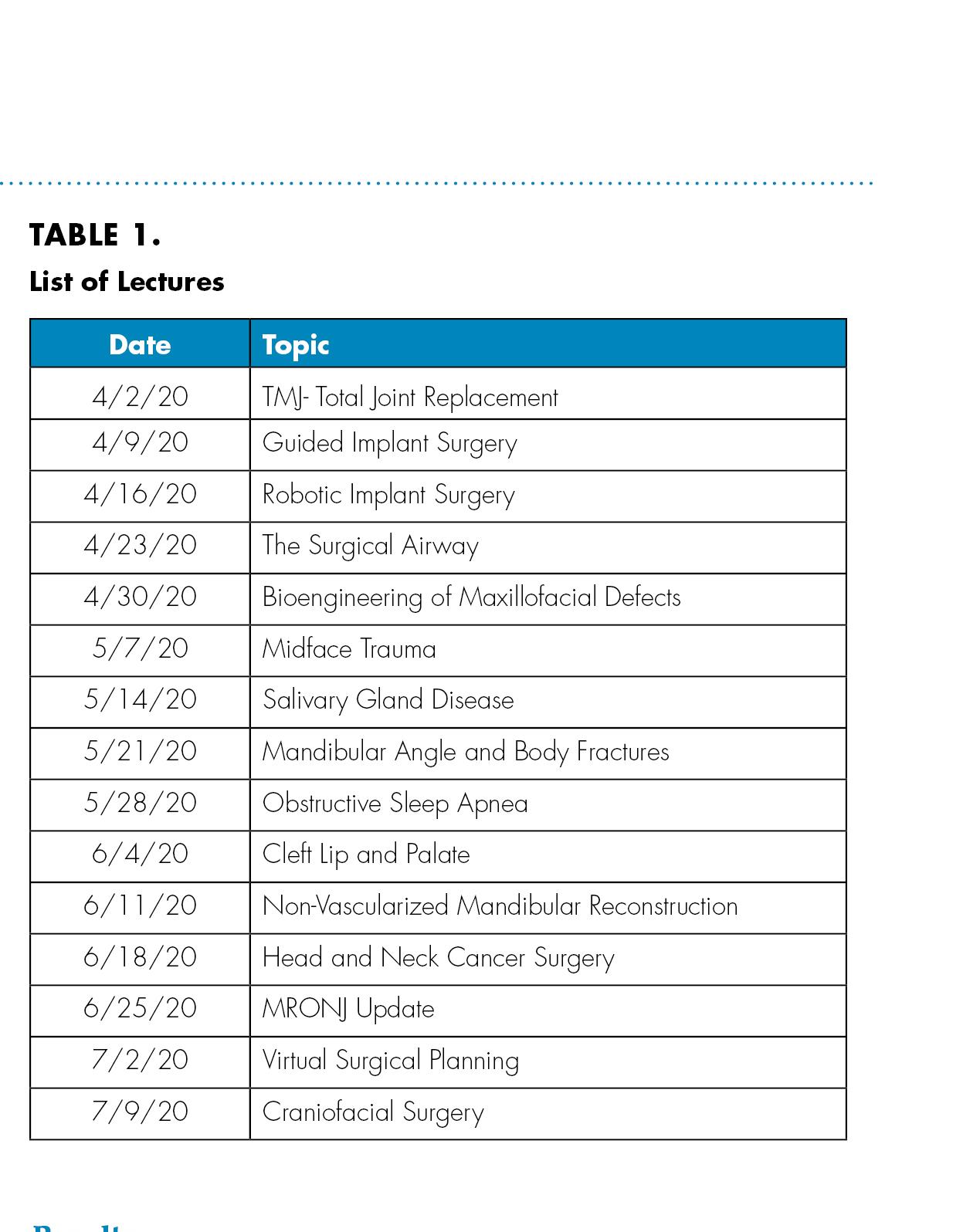
A second round of e-mails was sent 15 days later, in July 2020. Collection of responses was closed on July 15, 2020, three weeks after the initial email. Five general questions were asked in the survey (Figure 1).
All five questions offered multiple choice answers, allowing the responses to reflect if the participant thought lecture engagement and retention of knowledge were more, less or the same to that of a traditional learning setting. It also inquired whether the participant was exposed to a broader curriculum when compared to a traditional setting. For the survey to be submitted, all questions had to be answered.
Results
Of the 399 unique participants who were invited to take part in the survey, 77 (19.3%) returned responses. The distribution of respondents is listed in Table 2. It included residents, attend-
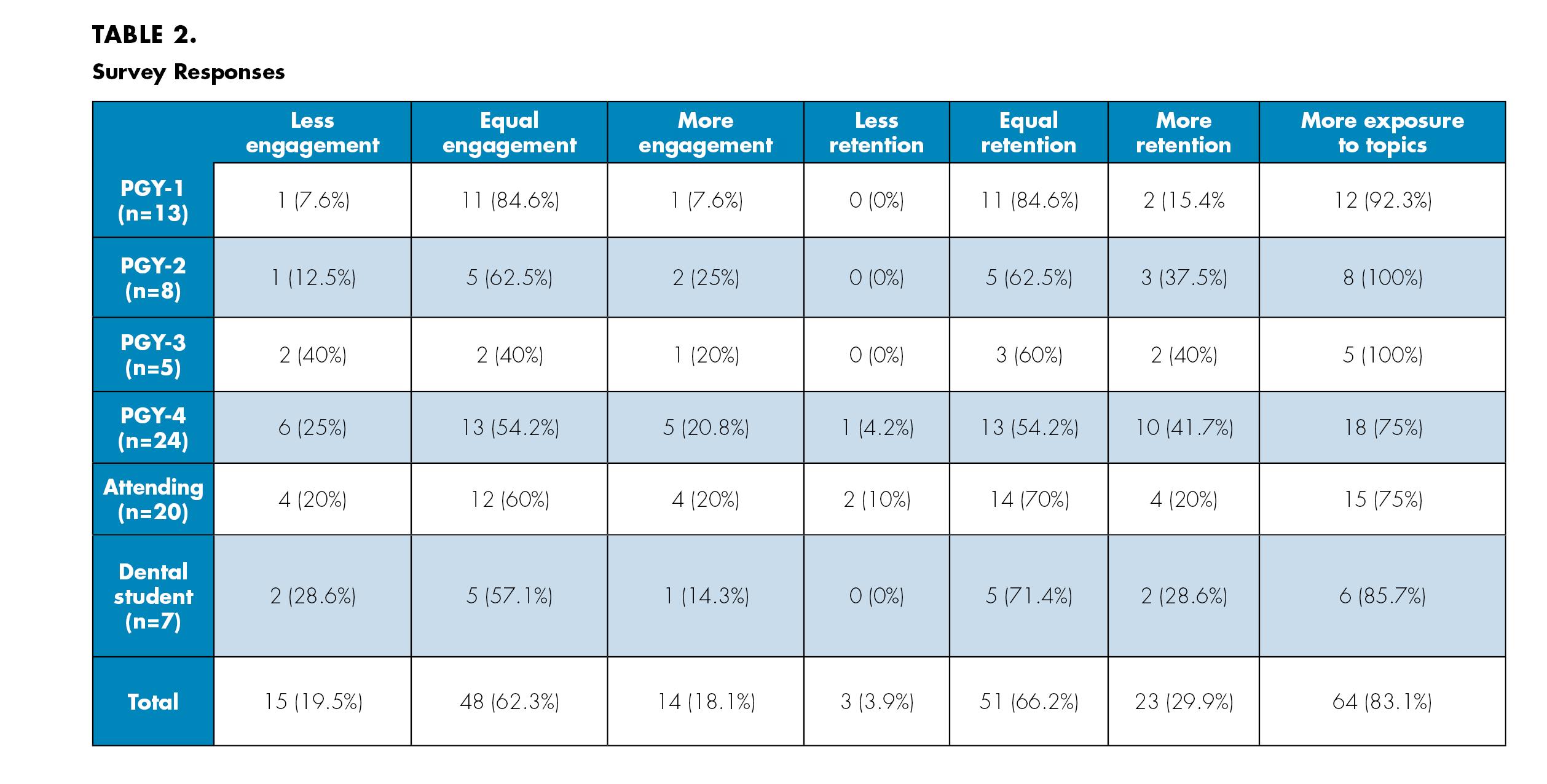
ings and dental students, with a majority being PGY-4 residents (29.6%) and attending surgeons (24.7%). A majority of participants (86%) heard of the lecture series through their program director.
When asked how virtual learning compared with traditional learning with respect to engagement with the lecture, 60% of respondents felt virtual learning was equally engaging; 19.5% felt it was less engaging; and 18% responded that virtual learning was more engaging than a traditional lecture. A statistically significant number of participants believed the lectures had equal engagement, as shown with ANOVA (p < 0.009), while there was no difference between less engagement and more engagement. Despite the mixed reaction to the engagement in the lecture, when asked about knowledge retention of virtual lectures, 96% of respondents felt that retention was equal to or greater than that of a traditional setting (p < 0.003). An overwhelming majority 83% (n=72) felt that the virtual lecture series exposed learners to topics not in their traditional curriculum.
Discussion
The Northwell Health/Long Island Jewish Medical Center lecture series was initiated on April 2, 2020, and commenced on July 9, 2020. The lectures were presented via Zoom every week, on Thursdays, at 1830h Eastern Standard Time. The lecture topics, listed in Table 1, were determined by the invited speaker based on a specific area of interest or expertise. They were quite variable, which was appropriate given that the lectures were supplements and not replacements for existing curriculum. The virtual lectures were synchronous learning experiences that concluded with an interactive question and answer period.
The responses received from this particular study suggest that the retention of knowledge from remote learning was equal to or better than from traditional lectures, regardless of training level. The lectures exposed participants to material that they were not exposed to in the past, presumably as a result of exposure to different practices at various institutions in wide geographic regions. Anecdotally, the lectures provided a sense of community among the programs, as was expressed by many of the participants.
The results of this survey suggest that the virtual learning platform provides a viable infrastructure for training residents that encourages collaboration between programs. Remote learning has the potential to play an effective role in education, even in the post-COVID-19 era. p
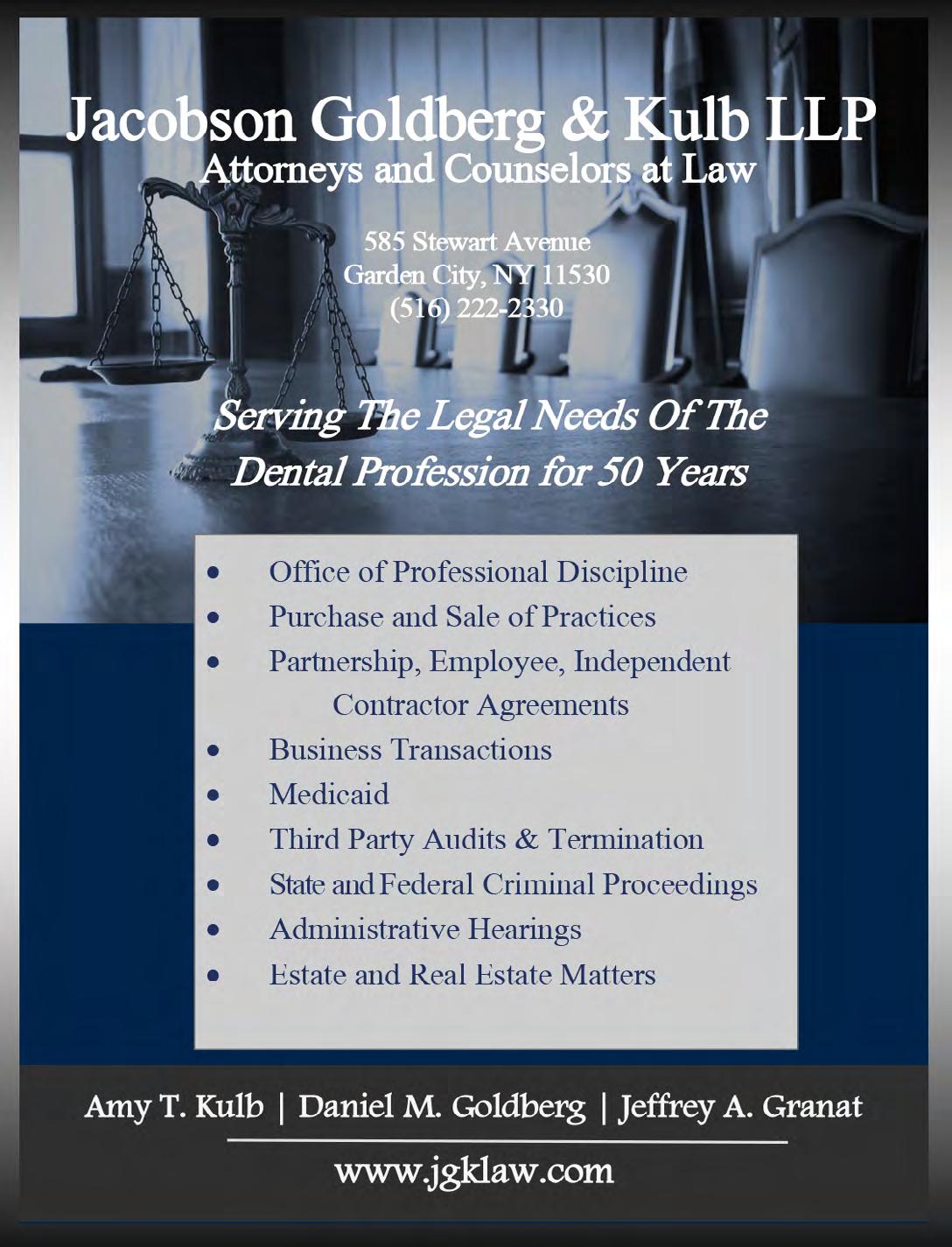
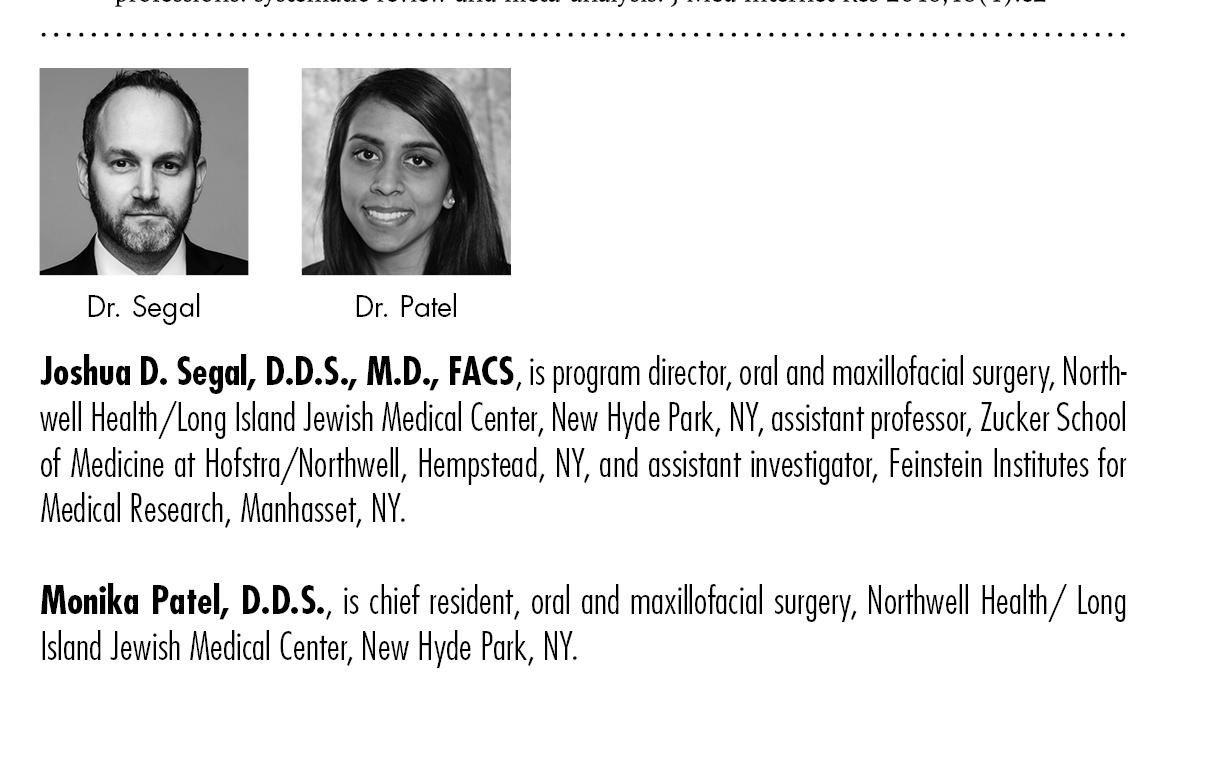
Queries about this article can be sent to Dr. Segal at jsegal@northwell.edu.
REFERENCES
1. CDC. Public Health Recommendations after Travel-Associated COVID-19 Exposure. Centers for Disease Control and Prevention. Coronavirus Disease 2019 (COVID-19). https:// www.cdc. gov/coronavirus/2019-ncov/php/risk-assessment.html. Accessed Apr 2 2020. 2. WHO. Coronavirus Disease (COVID-19) Advice for the Public. World Health Organization. Coronavirus disease 2019. https://www.who.int/emergencies/diseases/novel-coronavirus-2019/advic e-for-public. Accessed Apr 2 2020. 3. Liu Q, Peng W, Zhang F, Hu R, Li Y, Yan W. The effectiveness of blended learning in health professions: systematic review and meta-analysis. J Med Internet Res 2016;18(1):e2
Joshua D. Segal, D.D.S., M.D., FACS, is program director, oral and maxillofacial surgery, Northwell Health/Long Island Jewish Medical Center, New Hyde Park, NY, assistant professor, Zucker School of Medicine at Hofstra/Northwell, Hempstead, NY, and assistant investigator, Feinstein Institutes for Medical Research, Manhasset, NY.
Monika Patel, D.D.S., is chief resident, oral and maxillofacial surgery, Northwell Health/ Long Island Jewish Medical Center, New Hyde Park, NY.




